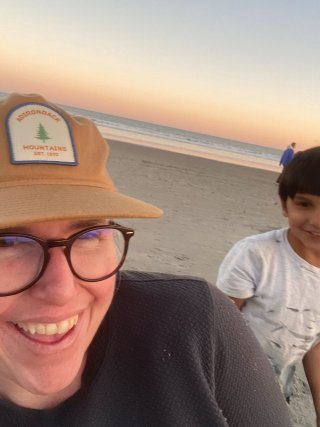Meet EPA Researcher Kate Mulvaney, Ph.D.

EPA researcher Kate Mulvaney is a social scientist who focuses on the human dimensions of coastal ecosystems and water quality. For this work, she conducts qualitative and quantitative data collection and analysis to better understand the impacts of people on the coastal and the coastal environment on people. In January 2025, Kate was awarded the Presidential Early Career Award for Scientists and Engineers (PECASE), the highest honor bestowed by the U.S. government on outstanding scientists and engineers early in their careers. She’s currently developing a survey for urban beaches to better understand the social value of these resources.
Tell us about your background.
I have a B.S. in marine biology from Roger Williams University, a M.A. in marine affairs from the University of Rhode Island, and a Ph.D. in natural resources social science from Purdue University.
When did you first know you wanted to work in environmental science?
I changed my major five times in my undergraduate program before I landed in the spot (marine science) that was most intellectually interesting and personally rewarding.
What do you like most about your job?
I like connecting people with real environmental benefits and problems. It helps regular people to see the connections they have to our resources and the importance of protecting the environment.
How does your science matter?
People cause environmental problems, are affected by environmental problems, and ultimately will need to be the solution. We need to better understand how humans contribute to all these aspects to bring about solutions.
If you weren’t a scientist, what would you be doing?
I would work in health care. After having kids, I was appalled at the care we give to birthing people.
What advice would you give a student interested in a career in science?
Try to get experience across a range of disciplines, methods, and research subjects. The science world is huge, fascinating, and filled with research needs. Take some time to find your place in it and don’t be afraid to ask questions.
What do you think the coolest scientific discovery was and why?
The world is too interesting for just one, but something I think is rad is using water fleas (Daphnia) for resurrection ecology. Eggs that are dormant for decades or even centuries are hatched to understand how animals existed in the past and have evolved.
If you could have dinner with any scientist, past or present, who would you choose and what would you talk about?
Leonardo da Vinci. I would love to learn about how he thought across the sciences, arts, and humanities.
What do you think is our biggest scientific challenge in the next 20/50/100 years?
Better connecting science and decision making — both developing research that can better inform decision making and having science better incorporated into decision making.
Editor's Note: The opinions expressed herein are those of the researcher alone. EPA does not endorse the opinions or positions expressed.
